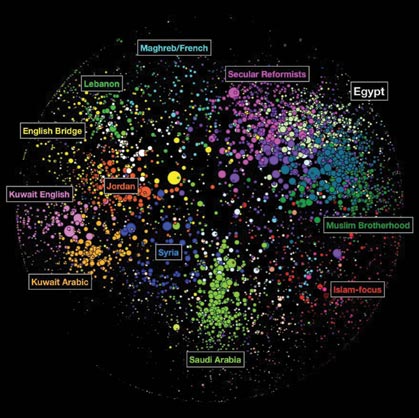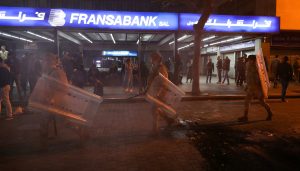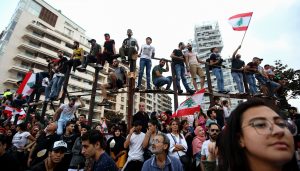From Conversation to Action
Where technology, media and culture meet. As 2010 begins, we look back on how the arab “blogosphere” has evolved and matured over the past year.
Words by Ramsey Tesdell. Powered by JO.JO

IT’S BEEN AN INTERESTING year for bloggers everywhere, but particularly in the Arab world. The past year has seen the recognition of bloggers as an important political and social force, but also an increase in the monitoring, harassment, and arrest or detention of bloggers. Perhaps the movement built around this simple technology is finally maturing.
Bloggers are increasingly being recognized in the Arab world as important aspect of the political agenda. Official comments on blogs (Jordan’s King Abdullah commented on black-iris.com in 2008) and invitations to important political events have marked the growing influence of the blogosphere in the Arab world.
Bloggers helped monitor elections in Lebanon, and Iran’s summer protests were fueled by bloggers and Twitter (or at least, that’s how the Western mainstream media saw it); and in Egypt, Tunisia and Morocco bloggers provided a constant source of opposition to repressive governments. These were important steps toward recognition on a wider political level, and should be recognized.
As more voices join the growing conversation, and more academics pore over the content, it seems an evolution of sorts is taking place. The young, diversified and fragmented blogosphere is organizing itself and taking on more sophisticated tasks as time pushes on, and as bloggers and their blogs grow.
Individual bloggers have also been helped along by the efforts of many in the Arab world to bring bloggers together to collaborate and support each other’s efforts. The recent Second Arab Bloggers Meeting, hosted in Beirut, showcased some of the activities that bloggers have become involved in. Monitoring instances of torture in Egypt, and of police brutality and bribery in Tunisia, and fighting against censorship in Morocco are activities that bloggers have adopted as a passion and, in some cases, as their full-time jobs.
The conference in Beirut was organized by Global Voices and the Heinrich Boell Foundation, and supported by Hivos. It brought together 70 of the top bloggers from around the region for a “BarCamp,” a kind of open-sourced conference in which participants proposed workshops and pitched them to their peers.
Workshops included technical subjects such as how to protect your identity online, or how to use Photoshop and video editing software, as well as discussions on funding and even whether or not to blog.
There have also been some interesting new academic approaches to the blogosphere that merit notice. In June, 2009, the Berkman Center for Internet & Society at Harvard University published an extensive study entitled Mapping the Arabic Blogosphere: Politics, Culture, and Dissent. Carried out by the same group that created a map of the Iranian blogosphere in 2008, the study was a massive undertaking that analyzed thousands of blogs from around the region, classified them and provided a foundation to continue studying the growing movement.
Among the study’s conclusions were that Arab blogging networks were organized primarily around countries, that local concerns tended to be more discussed than global or regional ones, and that outside of a small group of mostly English-language blogs, issues of terrorism and violent confrontation with the West were not a major focus of discussion. The study also looked at the emerging online ecosystems, and how Arab blogs connected to social networking and other Web 2.0 phenomena.
On a more micro-level, there are studies like a recent paper by Courtney Radsch published in the journal Arab Media and Society. Radsch writes that the Egyptian blogging movement has gone through three phases: experimentation, activism, and diversification/fragmentation.
She argues that as the blogging sphere has grown exponentially after entering the activist phase, wherein “bloggers became activists and activists became bloggers,” it became difficult to clearly describe the Egyptian blogging community. A group of elite and increasingly famous bloggers were influencing the media and provoking conversations that attracted worldwide media attention, but the simultaneous explosion of new blogs caused the blogosphere to become diversified and fragmented.
As bloggers’ influence has grown, they have also faced more restrictions and legal challenges. A new project has sprung up to track cases of “threatened voices.” The latest blogger to be arrested is Bashir Hazem, a 26-year-old Moroccan who posted a press release about students clashing with security forces. He was sentenced to four months in prison. Hazem and other bloggers who are harassed and monitored are among a growing number of threatened voices around the Arab world.
Arrest isn’t the only way regimes are exerting pressure on new voices. Monitoring movements and phone calls, applying pressure on bloggers’ families and using travel restrictions are also commonplace.
Wael Abbas, an influential Egyptian blogger, has been detained several times while traveling from Egypt; his family has been harassed and his home searched. Most recently he was detained on his way back from the Second Arab Bloggers Meeting; his laptop was confiscated and he has apparently been charged and sentenced in absentia to six months in prison for “building illegal WAN networks.”
In December, NPR ran a feature on how Iranian regime elements were using similarly unconventional tactics to crack down on citizens who were engaging in online activism while living outside the country.
“The Internet has served the Iranian opposition very well to organize and pass information on Facebook and on Twitter,” explained reporter Farnaz Fassihi. “It also has a flip side in which it’s allowed the regime to also monitor the activities of opposition supporters online and identify them.”
And on December 8, the Committee to Protect Journalists issued its annual report on journalists in prison, which noted that a large number of those currently in jail or threatened with jail were bloggers, or journalists targeted for their writings posted on the Internet.
All these examples demonstrate how the Arab blogosphere (if we can paint it all with just one brush) is going through dramatic changes as technologies develop, and social and political situations evolve. As this important conversation moves increasingly toward action, it’s important to remember that despite the emphasis on technology, the human and social elements of online life need to be at the center of the analysis.
It’s notable that more and more people, like those who’ve been mapping the Arab blogosphere, are considering blogs within a social media context that includes microblogging (Twitter), crowd-sourcing tools (wikis) and social networks (Facebook).
Looking at social media through this kind of systems analysis allows us to take the technology out of the center of the analysis and focus on the people behind these networks and discussions, and how they’re using tools such as Facebook, Twitter and blogs to interact and carry out collective action.










